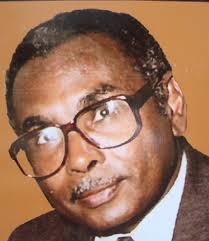Al Khatim Adlan was born in Umdaka Al Jaleen village in Gezira in Central Sudan in 1948. He studied at Medani Secondary School and University of Khartoum Faculty of Arts where he majored in Philosophy. As a student in University of Khartoum he shone as a serious political activist, thinker, philosopher, and intellectual of the highest caliber.
At a very young age, Al Khatim joined the Sudan Communist Party while he was in secondary school, and rose to be a member of its Central Committee. He was also a fierce advocate of voluntary unity amongst Sudanese based on universal values of equality that recognises Sudan’s religious, cultural, and ethnic diversity.
Al Khatim left Sudan and headed for the UK to escape persecution in 1994 where he was reunited with his family in London. Having tried to initiate radical reforms within the Communist Party without success, Al-Khatim and a number of his colleagues resigned from the party in the same year. In 1996, he founded with others the Sudan New Democratic Forces Movement (HAQ).

